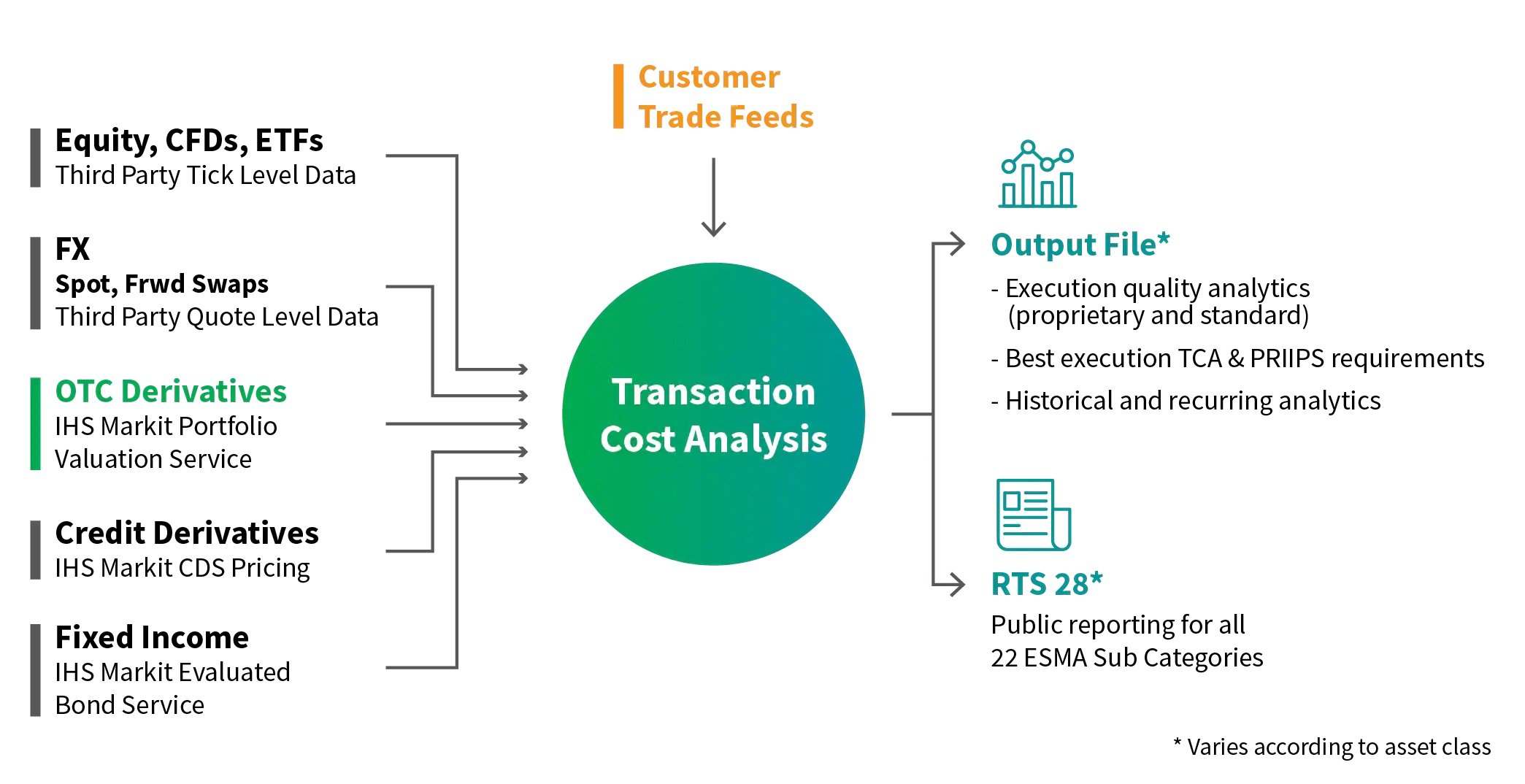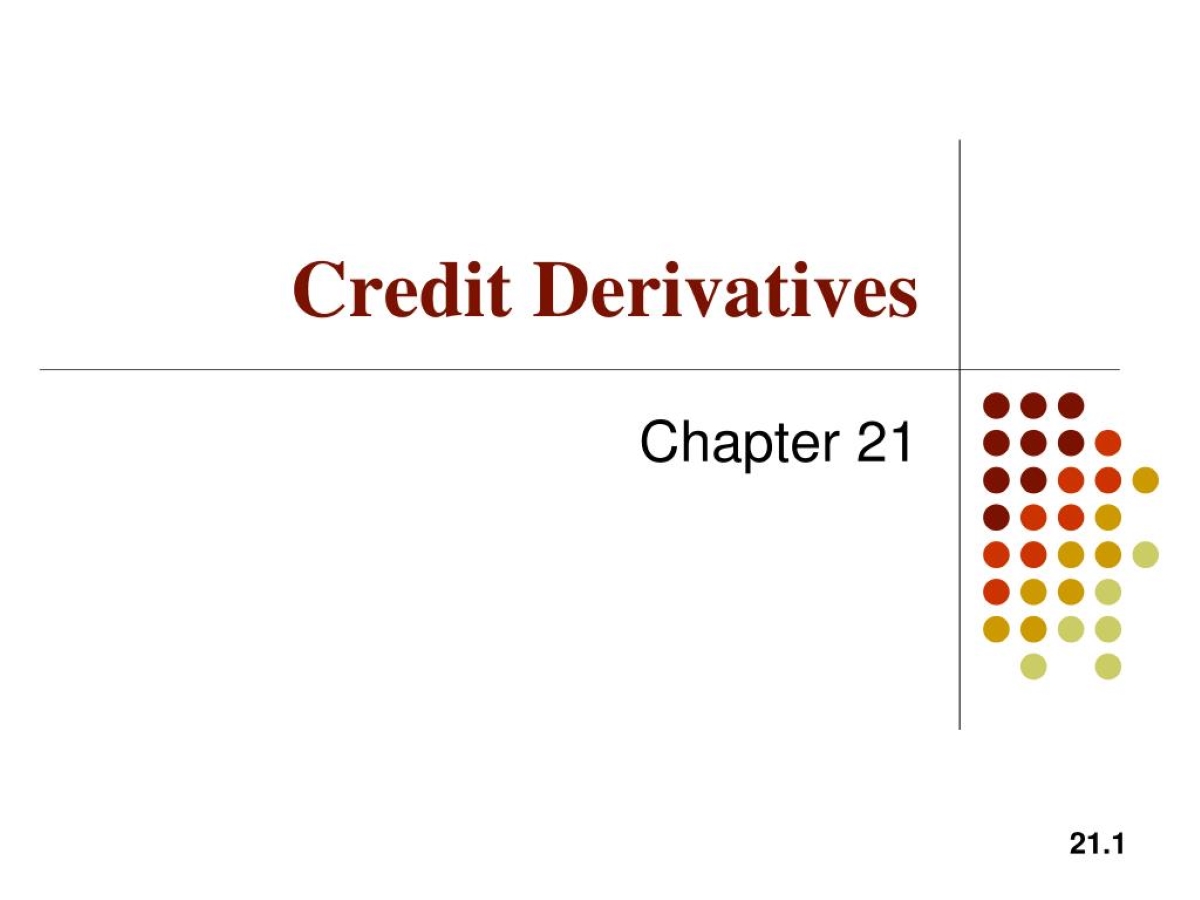

Finance
What Is A Derivatives Trader
Published: October 5, 2023
Discover the role and responsibilities of a derivatives trader in the finance industry. Learn about the skills and strategies used to succeed in this dynamic field.
(Many of the links in this article redirect to a specific reviewed product. Your purchase of these products through affiliate links helps to generate commission for LiveWell, at no extra cost. Learn more)
Table of Contents
Introduction
A derivatives trader is a finance professional who specializes in trading financial instruments known as derivatives. Derivatives are complex financial products that derive their value from an underlying asset or group of assets. These can include commodities, currencies, stocks, bonds, or even interest rates. Derivatives trading involves buying or selling these financial instruments in order to profit from changes in their value.
Derivatives are widely used in the financial markets for various purposes, including hedging against risks, speculating on price movements, and facilitating the transfer of risk between market participants. As a result, derivatives traders play a crucial role in the functioning of financial markets, providing liquidity and price discovery.
The job of a derivatives trader is dynamic and fast-paced, requiring a deep understanding of financial markets, trading strategies, and risk management. Traders must keep a close eye on market trends, economic indicators, and news events that can impact the value of the underlying assets. They utilize their expertise to make informed decisions about buying or selling derivatives to generate profits for themselves or their clients.
This article will explore the job description, skills and qualifications, education and training, types of derivatives traders, trading strategies, risk management, market analysis and research, salary and compensation, and career outlook for derivatives traders. Whether you are an aspiring trader or simply interested in learning more about this fascinating field, this article will serve as a comprehensive guide to the world of derivatives trading.
Job Description
A derivatives trader’s primary responsibility is to execute trades in derivatives to generate profit for themselves or their clients. They monitor market conditions, analyze data, and make informed decisions on when to buy or sell derivatives. Traders must have a deep understanding of the financial markets, including the specific derivatives they specialize in, as well as the underlying assets they are linked to.
Traders often work for financial institutions, such as investment banks, hedge funds, or proprietary trading firms. They may also work as independent traders or manage their clients’ portfolios. Regardless of their employment setting, derivatives traders typically perform the following tasks:
- Analyze market trends and economic indicators to identify potential trading opportunities.
- Develop and implement trading strategies to generate profits.
- Execute trades in a timely manner, using sophisticated trading platforms and systems.
- Monitor and manage risk exposure, utilizing risk management techniques and tools.
- Keep up to date with market news, events, and regulations that can impact the value of derivatives.
- Communicate with clients, brokers, and other traders to gather information and execute trades.
- Record and analyze trading data to evaluate performance and improve trading strategies.
Derivatives trading requires strong analytical skills, quick decision-making abilities, and the ability to handle high-pressure situations. Traders must be able to adapt to changing market conditions, as well as stay calm and focused during periods of volatility. They often work long hours and must be comfortable with taking calculated risks.
In addition to executing trades, derivatives traders may also be involved in developing and pricing new derivatives products, conducting research on market trends, and providing market commentary and analysis to clients. Some traders may specialize in specific types of derivatives, such as options, futures, or swaps, depending on their expertise and the needs of their organization.
Overall, a derivatives trader holds a challenging yet rewarding role that requires a combination of technical knowledge, analytical skills, and a keen awareness of market dynamics. By leveraging their expertise and staying abreast of market trends, derivatives traders play a critical role in the financial industry.
Skills and Qualifications
To succeed as a derivatives trader, individuals need a specific set of skills and qualifications. While the exact requirements may vary depending on the organization and the specific role, here are some key skills and qualifications that are typically sought after:
1. Strong Analytical Skills:
Derivatives traders must have exceptional analytical skills to interpret market data, identify trends, and make informed trading decisions. They should be able to analyze complex financial information, assess risk-reward ratios, and evaluate the potential outcomes of different trading strategies.
2. Financial Knowledge:
A deep understanding of financial markets, securities, and derivatives is essential for a derivatives trader. They must have knowledge of different asset classes, financial instruments, and the factors that influence their prices. This includes staying updated on economic indicators, corporate earnings reports, and other relevant market information.
3. Quantitative Skills:
Proficiency in quantitative analysis, including statistical modeling, mathematical calculations, and data interpretation, is crucial for derivatives traders. They should be comfortable working with mathematical models, pricing formulas, and risk management tools.
4. Decision-making Abilities:
Derivatives traders need to make quick and decisive decisions under pressure. They should possess strong decision-making abilities, considering various factors such as market conditions, risk tolerance, and trading strategies to make informed choices in a timely manner.
5. Risk Management:
Effective risk management is paramount for derivatives traders. They should have a thorough understanding of risk management principles and techniques, including setting stop-loss orders, implementing hedging strategies, and managing leverage. Traders must be able to assess and manage the risks associated with their trades.
6. Technology Proficiency:
Derivatives trading relies heavily on technology and trading platforms. Traders should be proficient in using trading software, order management systems, and analytical tools. They should also be comfortable with programming languages and have the ability to develop and implement automated trading strategies.
7. Communication and Interpersonal Skills:
Derivatives traders often work in team environments, and effective communication skills are essential. They need to be able to collaborate with colleagues, communicate trading strategies and ideas, and maintain relationships with clients, brokers, and other market participants.
8. Emotional Intelligence:
The ability to manage emotions and maintain composure in high-pressure situations is crucial for derivatives traders. They should be able to handle stress, adapt to market fluctuations, and keep their emotions in check to make objective trading decisions.
While a degree in finance, economics, or a related field is typically required, many successful derivatives traders have diverse educational backgrounds. Some traders hold advanced degrees, such as an MBA or a master’s in quantitative finance, while others gain experience through internships or entry-level positions in the finance industry.
In addition to formal education, practical experience in the financial industry, such as internships or working in trading-related roles, can provide valuable insights and enhance job prospects. Obtaining relevant certifications, such as the Chartered Financial Analyst (CFA) designation or the Financial Risk Manager (FRM) certification, can also demonstrate expertise in the field and boost credibility.
Derivatives trading is a highly competitive field, and continuous learning and adaptation are essential for success. Staying up to date with the latest market trends, regulatory changes, and industry developments is crucial for derivatives traders to thrive in their careers.
Education and Training
To pursue a career as a derivatives trader, a strong educational foundation is typically necessary. While there is no specific degree required to become a trader, most employers prefer candidates with a bachelor’s or master’s degree in finance, economics, mathematics, or a related field.
Many universities offer specialized programs in finance or financial engineering that provide a comprehensive understanding of the financial markets, quantitative analysis, and risk management. These programs often include coursework in derivatives, investment analysis, financial modeling, and statistical analysis.
While a degree is valuable, practical experience is equally important in the field of derivatives trading. Many aspiring traders gain practical knowledge and skills through internships or entry-level positions in financial institutions. These opportunities provide hands-on experience in trading platforms, market analysis, and risk management, allowing individuals to develop the necessary skills and industry knowledge.
In addition to formal education, professional certifications can enhance career prospects and demonstrate a commitment to the field. The most recognized certifications in finance include the Chartered Financial Analyst (CFA) designation and the Financial Risk Manager (FRM) certification. These certifications validate expertise in financial analysis, valuation, and risk management, which are highly relevant skills for derivatives traders.
Continued education and training are also crucial for staying up to date with the ever-evolving financial industry. Traders should actively seek opportunities to expand their knowledge, whether through industry conferences, workshops, or online courses. It is important to stay informed about changes in regulations, market trends, and emerging technologies that may impact derivatives trading.
Furthermore, technology plays a significant role in derivatives trading. Traders must be proficient in using trading platforms and software, as well as understanding algorithms and other technological advancements that impact the industry. Keeping up with technological advancements and continuously improving technical skills is vital.
In the field of derivatives trading, mentorship can also be valuable. Learning from experienced traders can provide insight into real-world trading strategies, risk management techniques, and market analysis approaches. Mentorship programs or networking opportunities within the finance community can facilitate such relationships.
Overall, a combination of formal education, practical experience, professional certifications, continuous learning, and mentorship can help aspiring traders build a strong foundation in derivatives trading and increase their chances of success in the field.
Types of Derivatives Traders
The field of derivatives trading offers various roles and opportunities, catering to different trading styles, markets, and financial instruments. Here are some common types of derivatives traders:
1. Proprietary Traders:
Proprietary traders work for financial institutions, such as investment banks or proprietary trading firms, and trade with the institution’s own capital. They aim to generate profits through speculative trading strategies. Proprietary traders have the flexibility to trade across different asset classes and derivatives, depending on the firm’s trading desk they are assigned to.
2. Options Traders:
Options traders specialize in trading options contracts, which give the holder the right to buy or sell an underlying asset at a predetermined price and within a specific time period. Options traders analyze volatility, market trends, and pricing models to identify opportunities for buying or selling options. They may employ strategies such as delta hedging, straddles, or iron condors to exploit market inefficiencies.
3. Futures Traders:
Futures traders focus on trading futures contracts, which obligate the parties involved to buy or sell an asset at a future date and a predetermined price. Futures traders speculate on price movements and aim to profit from the price differential between the contract’s entry and exit. They analyze supply and demand factors, market trends, and economic indicators to make trading decisions.
4. Swaps Traders:
Swaps traders specialize in trading swaps, which are derivative contracts that involve the exchange of cash flows based on different underlying variables, such as interest rates, currencies, or commodities. Swaps traders assist clients in managing their risk exposure and may engage in speculative trading to capitalize on market opportunities related to interest rates or other relevant factors.
5. Commodity Traders:
Commodity traders focus on trading derivative contracts based on commodities, such as energy, metals, agriculture, or livestock. They analyze supply and demand dynamics, geopolitical factors, and weather patterns that can affect commodity prices. Commodity traders may work for commodity trading firms, investment banks, or commodity hedge funds.
6. Forex Traders:
Forex traders specialize in trading currency pairs in the foreign exchange market. They analyze macroeconomic factors, geopolitical events, and central bank policies to predict currency movements. Forex traders often use technical analysis, charts, and indicators to identify trading opportunities and manage risk in the highly liquid and volatile forex market.
7. Algorithmic Traders:
Algorithmic traders use complex mathematical models and automated trading systems to execute trades. They develop algorithms that automatically generate buy or sell signals based on predefined parameters and market conditions. Algorithmic traders may focus on specific strategies or employ a variety of quantitative techniques, including statistical arbitrage, high-frequency trading, or trend-following strategies.
It is important to note that these categories are not mutually exclusive, and many derivatives traders may specialize in multiple areas or transition between different roles throughout their careers. The specific type of derivatives trader ultimately depends on individual skills, interests, and the opportunities available in the market.
Trading Strategies
Derivatives traders employ various trading strategies to profit from changes in the value of derivatives. These strategies are based on market analysis, risk management, and specific trading goals. Here are some common trading strategies used by derivatives traders:
1. Trend Following:
Trend following is a strategy where traders identify and capitalize on market trends. They aim to ride the trend and profit from the continuation of price movements. Traders may use technical analysis tools, such as moving averages or trend lines, to identify the direction of the trend and enter trades accordingly.
2. Mean Reversion:
Mean reversion is a strategy based on the belief that prices tend to move back to their average over time. Traders identify overbought or oversold conditions and expect the price to reverse. They may use technical indicators, such as oscillators or Bollinger Bands, to identify potential mean reversion opportunities.
3. Breakout Trading:
Breakout trading involves entering trades when the price breaks through a key support or resistance level. Traders anticipate that the price will continue to move in the direction of the breakout. They often use technical indicators, such as moving average crossovers or trendline breaks, to identify potential breakout opportunities.
4. Spread Trading:
Spread trading involves taking positions in multiple derivative contracts to profit from the price difference between them. Traders may trade calendar spreads, where they enter long and short positions in contracts with different expiration dates, or intermarket spreads, where they take positions in related derivatives contracts from different markets or asset classes.
5. Arbitrage:
Arbitrage is a strategy that involves exploiting price discrepancies between different markets or related instruments. Traders identify mismatches in prices and execute trades to profit from the price differential. This strategy requires quick and efficient execution to capitalize on fleeting opportunities.
6. Options Strategies:
Options traders employ various strategies using options contracts, such as straddles, strangles, or spreads. These strategies involve combinations of buying or selling options with different strike prices or expiration dates to profit from volatility, time decay, or anticipated price movements.
7. Volatility Trading:
Volatility trading focuses on taking advantage of changes in market volatility. Traders may use options or volatility derivatives to hedge or speculate on volatility levels. They analyze volatility indicators, such as the VIX index, and employ options strategies to profit from anticipated changes in volatility.
It is important to note that each trading strategy carries its own risks and rewards. Traders must carefully consider market conditions, risk tolerance, and their own trading strengths when selecting and implementing a strategy. Many traders combine different strategies or adapt their approach based on market conditions to optimize their trading results.
Risk Management
Risk management is a critical aspect of derivatives trading. Derivatives are inherently complex financial instruments that can expose traders to various risks, including market risk, credit risk, liquidity risk, and operational risk. Successful derivatives traders employ effective risk management strategies to protect their capital and minimize potential losses. Here are some key components of risk management in derivatives trading:
1. Setting Risk Parameters:
Traders establish risk parameters that define the maximum acceptable level of risk for each trade or portfolio. These parameters include stop-loss orders, which automatically exit a position if the price reaches a certain level, and position sizing guidelines, which limit the percentage of capital allocated to each trade.
2. Diversification:
Diversification is a risk management technique that involves spreading investments across different assets, markets, or trading strategies. By diversifying their portfolio, traders can reduce the risk associated with an individual position or market, as losses in one area can be offset by gains in another.
3. Use of Hedging Strategies:
Hedging is an important risk management technique that involves taking offsetting positions to reduce exposure to specific risks. Traders may use derivatives contracts to hedge against adverse price movements in the underlying assets. For example, a trader holding a long position in an asset may simultaneously enter a short position in a related derivative contract to mitigate potential losses.
4. Risk Assessment and Analysis:
Traders continuously assess and analyze the risks associated with their positions. They analyze market conditions, volatility levels, and other relevant factors to determine whether adjustments or risk mitigation strategies are necessary. Through ongoing risk analysis, traders can identify potential weaknesses in their trading strategies and take appropriate actions to manage and mitigate those risks.
5. Scenario Analysis and Stress Testing:
Traders perform scenario analysis and stress testing to evaluate the potential impact of adverse market conditions on their positions. By simulating scenarios with extreme market conditions, traders can assess the resilience of their portfolio and identify vulnerabilities. This helps them make informed decisions and implement risk mitigation strategies in preparation for unexpected market events.
6. Continuous Monitoring and Review:
Traders must continuously monitor their positions, market conditions, and risk exposures. Regular review of the performance and risk metrics allows for adjustments to be made to the trading strategy as needed. This ensures that the risk management approach remains effective in dynamic market environments.
7. Emotional Discipline:
Emotional discipline is a vital aspect of risk management. Traders must control their emotions and avoid making impulsive or emotionally driven trading decisions. Fear and greed can lead to poor risk management and undermine trading strategies. Developing emotional discipline and sticking to predetermined risk parameters are crucial for long-term success.
Adhering to sound risk management practices is essential for safeguarding capital and maintaining profitability in derivatives trading. Successful traders understand and manage the risks associated with their positions, adapt to changing market conditions, and implement strategies that balance risk and reward.
Market Analysis and Research
Market analysis and research are fundamental components of successful derivatives trading. Traders rely on thorough analysis and up-to-date information to make informed trading decisions. By conducting market analysis and research, traders can identify trading opportunities, assess risk, and develop effective strategies. Here are some key aspects of market analysis and research in derivatives trading:
1. Fundamental Analysis:
Traders use fundamental analysis to evaluate the intrinsic value of an underlying asset. This analysis involves examining economic indicators, company financials, industry trends, and other relevant factors that impact the value of the asset. By understanding the fundamental factors driving an asset’s price, traders can make informed decisions on whether to buy or sell derivatives linked to that asset.
2. Technical Analysis:
Technical analysis involves analyzing historical price and volume data to identify patterns, trends, and potential reversals in the market. Traders use various technical indicators, such as moving averages, trendlines, and oscillators, to generate buy or sell signals. Technical analysis helps traders identify entry and exit points, as well as potential support and resistance levels.
3. News and Market Events:
Traders stay updated with current news and market events that can impact the value of the underlying assets. They follow financial news outlets, economic calendars, and industry reports to identify trends, market sentiment, and potential catalysts that can affect prices. News and market events can provide valuable insights and help traders make timely decisions.
4. Market Trends and Sentiment Analysis:
By analyzing market trends and sentiment, traders can gauge the overall mood and expectations of market participants. This analysis involves monitoring market indicators, sentiment indexes, and social media trends to identify shifts in market sentiment. Understanding market trends and sentiment can help traders anticipate potential price movements and adjust their trading strategies accordingly.
5. Data Analysis and Modeling:
Traders often utilize quantitative methods and statistical modeling techniques to analyze data and identify patterns. They may develop proprietary models or use existing models to forecast market trends, price movements, or volatility. Data analysis and modeling help traders make data-driven decisions and automate trading strategies.
6. Macro and Microeconomic Analysis:
Traders analyze macro and microeconomic factors that can impact the financial markets and the value of derivatives. They assess interest rates, inflation, GDP growth, political developments, and other macroeconomic indicators to determine the overall health and direction of the economy. Microeconomic analysis involves understanding specific industry trends, company performance, and market disruptors.
7. Quantitative Research:
Quantitative research plays a significant role in derivatives trading. Traders use statistical techniques, mathematical models, and algorithmic strategies to analyze and predict market behavior. They may develop trading models, test hypotheses, and backtest strategies using historical data to determine the viability and profitability of their trading approaches.
Market analysis and research are ongoing processes in derivatives trading. Traders constantly evaluate market conditions, assess risk, and gather relevant information to make informed trading decisions. By combining different analysis techniques and staying up to date with market developments, traders can maximize their chances of success in the dynamic and ever-changing financial markets.
Salary and Compensation
The salary and compensation for derivatives traders can vary significantly depending on factors such as experience, location, employer, and performance. Derivatives trading is a highly competitive field, and successful traders have the potential to earn substantial rewards. Here are some key factors to consider regarding salary and compensation:
1. Base Salary:
Derivatives traders typically receive a base salary that serves as a guaranteed income. The base salary can vary depending on the trader’s level of experience, the size and reputation of the employer, and the location of the job. Entry-level traders may start with salaries ranging from $50,000 to $100,000, while experienced traders in top-tier financial institutions can earn significantly higher base salaries, potentially exceeding $200,000 per year.
2. Bonuses and Performance-based Pay:
Performance-based pay, such as bonuses, is a significant component of compensation for derivatives traders. Bonuses are often tied to individual and firm performance, and they can be a substantial portion of a trader’s total compensation. Successful traders who generate high profits for their firms may earn substantial bonuses that can surpass their base salary. Conversely, poor performance may result in lower bonuses or no bonuses at all.
3. Profit Sharing:
In some cases, derivatives traders may be eligible for profit-sharing arrangements. This means that traders receive a portion of the profits generated by their trading activities, in addition to their base salary and bonuses. Profit-sharing arrangements can be an attractive incentive for traders as they directly align the trader’s interests with the profitability of their trades.
4. Commissions and Fees:
Traders who work in brokerage firms or as independent traders may earn a portion of their income through commissions or fees. They earn a commission or fee for each trade executed or may charge clients for the services provided. Commissions and fees can vary based on the volume of trading, the complexity of the trades, and specific agreements with clients.
5. Benefits and Perks:
Derivatives traders often receive a range of benefits and perks as part of their compensation packages. These can include health insurance, retirement plans, paid time off, stock options, or access to company resources and amenities. The specific benefits and perks can vary depending on the employer and the trader’s level within the organization.
6. Variations by Location:
Salaries and compensation in derivatives trading can differ significantly based on the geographical location of the trader. Cities with major financial centers, such as New York, London, or Hong Kong, tend to offer higher salaries and bonuses compared to smaller financial hubs or regions with a less developed derivatives market.
7. Career Progression:
As traders gain experience and establish a track record of success, their earning potential generally increases. Experienced traders may have the opportunity to move into senior roles, such as trading team leads, portfolio managers, or even start their own hedge funds. These positions often come with higher compensation and additional profit-sharing opportunities.
It’s important to note that while the potential for high earnings exists in derivatives trading, it comes with substantial risks and pressures. Traders must demonstrate consistent profitability and manage risk effectively to warrant higher compensation.
Overall, the compensation for derivatives traders can be rewarding, but it is highly variable based on personal performance, market conditions, and individual circumstances. Traders must strive to continually improve their trading skills, deliver strong results, and adapt to changing market dynamics to maximize their earning potential.
Career Outlook
The career outlook for derivatives traders is influenced by various factors, including market conditions, industry trends, regulatory changes, and technological advancements. While the field of derivatives trading can offer lucrative opportunities, it is important to note that competition is fierce, and success requires a combination of skill, knowledge, and adaptability. Here are some key aspects to consider regarding the career outlook for derivatives traders:
1. Demand for Derivatives Traders:
The demand for derivatives traders is influenced by the overall health and growth of the financial industry. As financial markets continue to evolve and become more sophisticated, there is a consistent need for skilled traders who can navigate complex derivatives markets and provide liquidity. Traders with specialized knowledge and expertise in specific asset classes or trading strategies may have an advantage in terms of job opportunities.
2. Market Volatility and Global Events:
Market volatility plays a significant role in the demand for derivatives traders. During periods of heightened market volatility, such as economic crises or global events, trading activity tends to increase, leading to greater demand for experienced traders who can manage risk and exploit market opportunities. Traders who can effectively navigate through volatile markets have an edge in their career prospects.
3. Regulatory Environment:
The regulatory landscape has a direct impact on the derivatives trading industry. Regulatory changes aimed at increasing transparency and reducing risk can influence trading strategies, capital requirements, and the overall structure of the derivatives market. Traders who stay updated on regulatory developments and demonstrate compliance with regulations will be better positioned for long-term success in the industry.
4. Technological Advancements:
Technological advancements continue to shape the derivatives trading industry. Automated trading systems, algorithmic strategies, and artificial intelligence have revolutionized trading practices. Traders who embrace technology, develop programming skills, and leverage sophisticated trading platforms can enhance their efficiency and competitiveness in the market.
5. Globalization and Emerging Markets:
The globalization of financial markets has created new opportunities for derivatives traders. Emerging markets, in particular, offer significant growth potential and increased demand for derivatives trading services. Traders who have expertise in specific regions or emerging market economies may find promising career prospects by capitalizing on these opportunities.
6. Professional Development and Continuous Learning:
Traders who invest in professional development and continuous learning have a greater advantage in the industry. Staying updated with market trends, honing trading strategies, and acquiring new skills contribute to long-term career growth. Pursuing advanced degrees, certifications, and participating in industry events or networking activities can enhance career prospects and open doors to broader opportunities.
7. Evolving Roles and Specializations:
The field of derivatives trading continues to evolve, leading to the emergence of new roles and specializations. Traders who are adaptable and willing to acquire expertise in emerging areas, such as cryptocurrency derivatives or sustainable finance, may find unique niche opportunities that align with evolving market trends.
In summary, the career outlook for derivatives traders remains promising, but it requires continuous adaptation and improvement. Success in the field depends on factors such as market conditions, individual skills, specialized knowledge, technological know-how, and a commitment to ongoing learning and professional development.
Conclusion
Derivatives trading is a dynamic and exciting field within the financial industry that offers opportunities for skilled professionals to thrive. As a derivatives trader, individuals play a crucial role in financial markets by providing liquidity, managing risk, and capitalizing on price movements of derivative instruments.
To excel as a derivatives trader, it is essential to have a strong understanding of financial markets, risk management techniques, and trading strategies. A combination of qualitative and quantitative skills, along with continuous learning and adaptability, is key to success in this competitive industry.
Market analysis and research are integral components of derivatives trading, guiding traders in identifying trading opportunities, assessing risk, and developing effective strategies. By conducting thorough analysis, staying attuned to market trends, and utilizing advanced trading tools, traders can make informed decisions and maximize their profitability.
While the potential for high earnings exists in derivatives trading, it does come with inherent risks and pressures. Traders must diligently manage risk, adhere to strict risk parameters, and maintain emotional discipline to navigate volatile market conditions successfully.
The career outlook for derivatives traders is influenced by various factors, including market conditions, regulatory changes, and technological advancements. Demand for skilled traders remains strong, particularly in areas where specialization and expertise are valued. Continuous professional development, staying updated on industry trends, and embracing technological advancements are key to long-term success in this ever-evolving field.
In conclusion, derivatives trading offers individuals with a passion for finance and an aptitude for risk management an exciting and rewarding career path. By honing their skills, adopting innovative strategies, and staying ahead of industry developments, derivatives traders can position themselves for a fulfilling and prosperous career in the dynamic world of financial markets.














